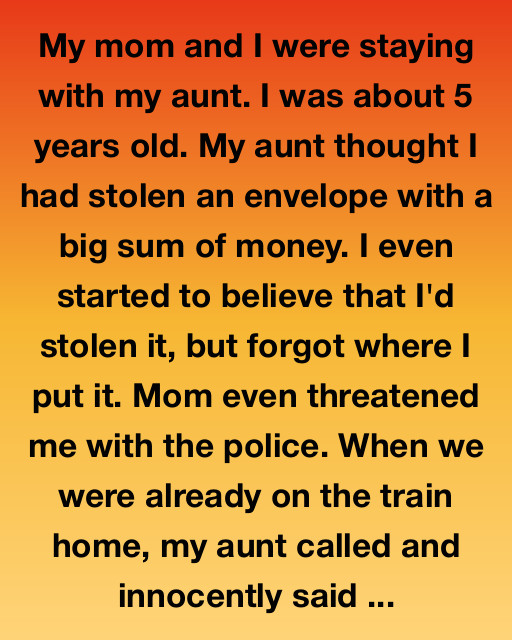When I was around 5 years old, my mom and I were staying at my aunt’s house. She thought I had stolen an envelope with a large sum of money. I even began to believe I had taken it, but I had simply forgotten where I put it. My mom even threatened me with the police.
By the time we were on the train home, my aunt called innocently: “Oh, I found it! It slipped behind the drawer.”
I remember the silence that followed. My mom didn’t speak for a long minute. She just held the phone tightly to her ear, her face tense, her knuckles white from gripping it so hard. I didn’t understand everything back then, but I knew I shouldn’t breathe too loudly. Then she muttered something like “okay” and hung up.
She didn’t apologize. Not then, not that day, not that week. I kept waiting for maybe a candy bar or some small way of saying “sorry,” but all I got was silence and coldness. The worst part? I started to believe I was a thief.
For months, I checked my pockets to make sure I hadn’t “accidentally” taken anything. I avoided touching things that weren’t mine. At school, if I found a coin on the floor, I’d run to the teacher, terrified someone might accuse me. That one little accusation changed the way I saw myself for years.
By the time I was 11, I had become the most responsible kid you could meet. I folded my clothes neatly, never forgot homework, and always said “please” and “thank you.” I figured that if I could just be good enough, everyone would forget that one moment when they thought I was a little thief.
On a school trip to the museum, the teacher’s wallet went missing. Everyone had to empty their backpacks. I was the only one with the same brand of wallet. Even though it had my name inside and only a few coins, I could feel the teacher’s eyes on me.
But the wallet was found—one of the girls had dropped it behind her seat. That night I cried—not because of the wallet, but because that childhood moment still haunted me.
When I was 17, I worked at a bakery owned by an older couple, Doru and Elena. They were kind but strict. Everything had to be counted, recorded, and labeled. One morning, 500 lei went missing from the register. Doru looked at me and asked, “Did you see anything unusual yesterday?”
That look… it was like being five years old again.
A week later, the mystery was solved: Doru had accidentally taken the money home, wrapped in a paper towel. He gave me a croissant and said, “Sorry, kid. I should’ve known.”
For that week, all the childhood scars reopened. I realized how quickly trust can disappear—and how long it takes to earn it back.
Years later, I studied psychology, specializing in child development. I wanted to understand the power of false accusations and how they shape self-esteem. During my research, I heard stories that sounded all too familiar. One boy, David, was blamed for breaking a vase at age six. He stopped speaking for almost three months. “Words didn’t matter,” he said. “They had already decided who I was.”
After graduation, I returned home and spoke with my mom about the envelope. “I think that moment shaped who I became,” I said. She paused, then admitted, “I panicked. I didn’t know what else to do… And you were there.”
It wasn’t an apology, but it was honest. She also told me she had cried on the train after that phone call. I realized I wasn’t the only one carrying that weight.
That inspired me to write a children’s book—a story about a little boy blamed for losing a golden key, only for the adults to find it later in the garden. The message was simple: adults make mistakes, and it’s always okay to say “sorry.”
Years later, my aunt read the book and sent me a letter: “I know the envelope was the golden key. I’m so sorry. I didn’t realize how much it hurt you.” She included 200 lei and a note: “Money can’t fix the past, but maybe this envelope can carry a better memory now.”
I cried—not because of the money, but because the five-year-old inside me finally felt seen and heard.
The lesson? Words matter, especially to children. If you ever make a mistake, it’s never too late to apologize. You might just change someone’s story.
